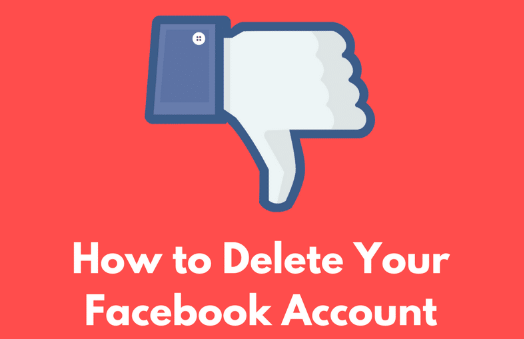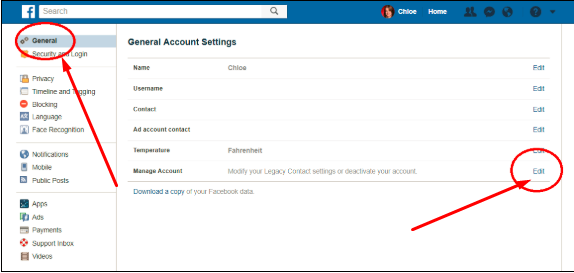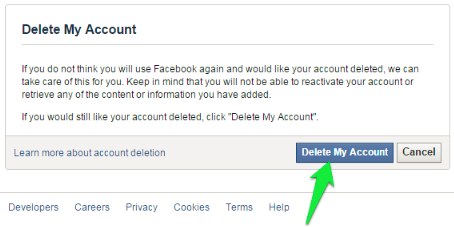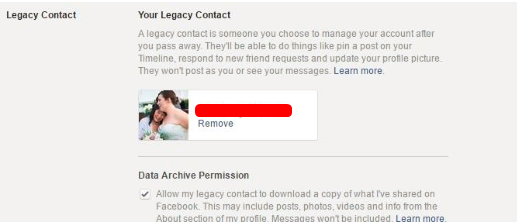Deleting Facebook Account 2019
By
MUFY UJASH
—
Jul 21, 2019
—
Deleting Facebook Account
Recent events might have you considering a break from Facebook. That's not an alternative for every person; because instance, just tighten up your account settings. Deleting Facebook Account: Yet if having your information extracted for political objectives without your authorization sketches you out, there are means to liberate yourself from the large social network.
If you await a social media sites break, here's ways to delete Facebook.
Deleting Facebook Account
Deactivating
Facebook offers you two alternatives: 2 options: deactivate or delete
The first could not be easier. On the desktop computer, click the drop-down menu at the top-right of your screen as well as pick settings. Click General on the leading left, Edit beside "Manage Account" Scroll down and also you'll see a "Deactivate My Account" link at the bottom. (Right here's the direct link to use while logged in.).
If you get on your mobile device, such as making use of Facebook for iOS, in a similar way go to settings > Account settings > General > Manage Account > Deactivate.
Facebook doesn't take this gently - it'll do whatever it can to maintain you about, including emotional blackmail concerning how much your friends will miss you.
Because of this, "Deactivation" is not the same as leaving Facebook. Yes, your timeline will certainly vanish, you will not have accessibility to the site or your account through mobile apps, friends can't publish or contact you, and you'll lose accessibility to all those third-party solutions that use (or require) Facebook for login. However Facebook does not erase the account. Why? So you could reactivate it later.
Just if anticipated re-activation isn't really in your future, you need to download a copy of all your data on Facebook - posts, pictures, videos, chats, etc.-- from the settings menu (under "General"). What you find could surprise you, as our Neil Rubenking found out.
Account Deletion
To completely erase your Facebook account forever and ever, most likely to the Delete My Account web page at https://www.facebook.com/help/delete_account. Simply understand that, each the Facebook data use policy "after you remove details from your profile or erase your account, copies of that info could stay viewable somewhere else to the extent it has been shown to others, it was or else dispersed pursuant to your personal privacy settings, or it was copied or saved by various other customers.".
Translation: if you composed a comment on a friend's status upgrade or photo, it will certainly continue to be after you delete your very own profile. Some of your posts as well as photos might hang around for as long as 90 days after deletion, also, though simply on Facebook web servers, not live on the site.
Deletion in behalf of Others
If you intend to inform Facebook concerning an individual you understand is under 13, you can report the account, you narc. If Facebook could "sensibly verify" the account is utilized by a person underage-- Facebook outlaws children under 13 to follow federal legislation-- it will certainly remove the account instantaneously, without informing any individual.
There's a separate type to demand elimination of accounts for individuals that are medically incapacitated as well as thus not able to utilize Facebook. For this to work, the requester should prove they are the guardian of the individual in question (such as by power of attorney) in addition to offer an official note from a doctor or clinical center that define the incapacitation. Edit any type of details necessary to maintain some personal privacy, such as medical account numbers, addresses, etc.
If a user has passed away, a legacy contact-- a Facebook friend or family member who was designated by the account owner before they died-- can obtain accessibility to that individual's timeline, once approved by Facebook. The heritage call may need to supply a connect to an obituary or other documents such as a death certification. Facebook will certainly "memorialize" the page so the dead timeline survives on (under control of the legacy get in touch with, who can't upload as you), or if liked, remove it.
Assign a specific tradition contact individual to handle your account after your passing. You can discover that under settings > General > Manage Account > Your Legacy Contact. Once you established one up, you'll get a notice yearly from Facebook to check that the get in touch with must stay the same, unless you pull out of that. You could likewise take the extra step of ensuring that after you die, if the heritage get in touch with does report you to Facebook as deceased, your account gets removed (even if the heritage call desires the timeline to be hallowed).
If you await a social media sites break, here's ways to delete Facebook.
Deleting Facebook Account
Deactivating
Facebook offers you two alternatives: 2 options: deactivate or delete
The first could not be easier. On the desktop computer, click the drop-down menu at the top-right of your screen as well as pick settings. Click General on the leading left, Edit beside "Manage Account" Scroll down and also you'll see a "Deactivate My Account" link at the bottom. (Right here's the direct link to use while logged in.).
If you get on your mobile device, such as making use of Facebook for iOS, in a similar way go to settings > Account settings > General > Manage Account > Deactivate.
Facebook doesn't take this gently - it'll do whatever it can to maintain you about, including emotional blackmail concerning how much your friends will miss you.
Because of this, "Deactivation" is not the same as leaving Facebook. Yes, your timeline will certainly vanish, you will not have accessibility to the site or your account through mobile apps, friends can't publish or contact you, and you'll lose accessibility to all those third-party solutions that use (or require) Facebook for login. However Facebook does not erase the account. Why? So you could reactivate it later.
Just if anticipated re-activation isn't really in your future, you need to download a copy of all your data on Facebook - posts, pictures, videos, chats, etc.-- from the settings menu (under "General"). What you find could surprise you, as our Neil Rubenking found out.
Account Deletion
To completely erase your Facebook account forever and ever, most likely to the Delete My Account web page at https://www.facebook.com/help/delete_account. Simply understand that, each the Facebook data use policy "after you remove details from your profile or erase your account, copies of that info could stay viewable somewhere else to the extent it has been shown to others, it was or else dispersed pursuant to your personal privacy settings, or it was copied or saved by various other customers.".
Translation: if you composed a comment on a friend's status upgrade or photo, it will certainly continue to be after you delete your very own profile. Some of your posts as well as photos might hang around for as long as 90 days after deletion, also, though simply on Facebook web servers, not live on the site.
Deletion in behalf of Others
If you intend to inform Facebook concerning an individual you understand is under 13, you can report the account, you narc. If Facebook could "sensibly verify" the account is utilized by a person underage-- Facebook outlaws children under 13 to follow federal legislation-- it will certainly remove the account instantaneously, without informing any individual.
There's a separate type to demand elimination of accounts for individuals that are medically incapacitated as well as thus not able to utilize Facebook. For this to work, the requester should prove they are the guardian of the individual in question (such as by power of attorney) in addition to offer an official note from a doctor or clinical center that define the incapacitation. Edit any type of details necessary to maintain some personal privacy, such as medical account numbers, addresses, etc.
If a user has passed away, a legacy contact-- a Facebook friend or family member who was designated by the account owner before they died-- can obtain accessibility to that individual's timeline, once approved by Facebook. The heritage call may need to supply a connect to an obituary or other documents such as a death certification. Facebook will certainly "memorialize" the page so the dead timeline survives on (under control of the legacy get in touch with, who can't upload as you), or if liked, remove it.
Assign a specific tradition contact individual to handle your account after your passing. You can discover that under settings > General > Manage Account > Your Legacy Contact. Once you established one up, you'll get a notice yearly from Facebook to check that the get in touch with must stay the same, unless you pull out of that. You could likewise take the extra step of ensuring that after you die, if the heritage get in touch with does report you to Facebook as deceased, your account gets removed (even if the heritage call desires the timeline to be hallowed).








